- Clone
- OX-1 (See other available formats)
- Regulatory Status
- RUO
- Other Names
- Leukocyte common antigen, LCA, T200, Ly-5
- Isotype
- Mouse IgG1, κ
- Ave. Rating
- Submit a Review
- Product Citations
- publications
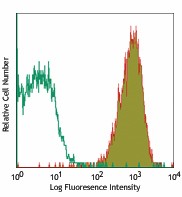
-

LOU rat splenocytes stained with biotinylated OX-1, followed by Sav-PE
CD45 is a 180-220 kD protein also known as leukocyte common antigen (LCA). It is a protein tyrosine phosphatase with multiple isoforms differing as a result of alternative splicing of the extracellular domain and glycosylation. CD45 is expressed on all hematopoietic cells except erythrocytes and platelets; isoform expression depends on cell type, activation state, and cell maturation. CD45 functions in signal transduction through T and B cell antigen receptors. CD45 has been shown to interact with various proteins including galectin-1, CD2, CD3, and CD4. The OX-1 antibody has been shown to partially inhibit NK cell-mediated lysis of syngeneic tumor cells in vitro.
Product DetailsProduct Details
- Verified Reactivity
- Rat
- Antibody Type
- Monoclonal
- Host Species
- Mouse
- Immunogen
- Enriched glycoprotein fraction from Wistar rat thymocytes
- Formulation
- Phosphate-buffered solution, pH 7.2, containing 0.09% sodium azide
- Preparation
- The antibody was purified by affinity chromatography, and conjugated with biotin under optimal conditions.
- Concentration
- 0.5 mg/ml
- Storage & Handling
- The antibody solution should be stored undiluted between 2°C and 8°C. Do not freeze.
- Application
-
FC - Quality tested
- Recommended Usage
-
Each lot of this antibody is quality control tested by immunofluorescent staining with flow cytometric analysis. For flow cytometric staining, the suggested use of this reagent is ≤ 0.25 µg per million cells in 100 µl volume. It is recommended that the reagent be titrated for optimal performance for each application.
- Application Notes
-
Additional reported applications (for the relevant formats) include: immunoprecipitation1, immunofluorescence microscopy (acetone fixed, ammonium-thiocyanate separated epidermal sheets)2, immunohistochemistry of acetone3-, isopentane-4, PLP5-, and n-hexane6 fixed frozen sections and paraffin-embedded sections7,8, and partial inhibition of NK cell lysis of syngeneic tumor cell lines1.
-
Application References
(PubMed link indicates BioLegend citation) -
- Giezeman-Smits KM, et al. 1999. J. Immunol. 163:71. (IP)
- Elbe A, et al. 1994. J. Invest. Dermatol. 102:74. (IF)
- Kouwenhoven E, et al. 2001. Kidney Int. 59:1142. (IHC)
- Martin A, et al. 1995 Clin. Exp. Immunol. 22:283. (IHC)
- Sayegh MH, et al. 1995 J. Exp. Med. 181:186. (IHC)
- Morioka Y, et al. 2000. Kidney Int. 60:2192. (IHC)
- Ng YY, et al. 2005. Kidney Int. 94:S83. (IHC-P)
- Huang XR, et al. 2003. JASN. 14:1738. (IHC-P)
- Product Citations
-
- RRID
-
AB_314004 (BioLegend Cat. No. 202203)
Antigen Details
- Structure
- Protein tyrosine phosphatase, type I transmembrane protein, 180-220 kD (multiple isoforms and differential glycosylation)
- Distribution
-
All hematopoietic cells except erythrocytes and platelets
- Function
- T cell receptor and B cell receptor signal transduction
- Ligand/Receptor
- Galectin-1, CD2, CD3, CD4
- Biology Area
- Cell Biology, Immunology, Inhibitory Molecules, Neuroscience, Neuroscience Cell Markers
- Molecular Family
- CD Molecules
- Antigen References
-
1. Sunderland CA, et al. 1979. Eur. J. Immunol. 9:155.
2. Woolett GR, et al. 1985. Eur. J. Immunol.. 15:168. - Gene ID
- 24699 View all products for this Gene ID
- UniProt
- View information about CD45 on UniProt.org
Related FAQs
- How many biotin molecules are per antibody structure?
- We don't routinely measure the number of biotins with our antibody products but the number of biotin molecules range from 3-6 molecules per antibody.
Other Formats
View All CD45 Reagents Request Custom Conjugation| Description | Clone | Applications |
|---|---|---|
| Purified anti-rat CD45 | OX-1 | FC,IHC-P,IHC-F,IP |
| Biotin anti-rat CD45 | OX-1 | FC |
| FITC anti-rat CD45 | OX-1 | FC |
| PE anti-rat CD45 | OX-1 | FC |
| APC/Cyanine7 anti-rat CD45 | OX-1 | FC |
| PE/Cyanine7 anti-rat CD45 | OX-1 | FC |
| PerCP/Cyanine5.5 anti-rat CD45 | OX-1 | FC |
| Alexa Fluor® 488 anti-rat CD45 | OX-1 | FC |
| Alexa Fluor® 647 anti-rat CD45 | OX-1 | FC |
| Alexa Fluor® 700 anti-rat CD45 | OX-1 | FC |
| APC/Fire™ 750 anti-rat CD45 | OX-1 | FC |
| Pacific Blue™ anti-rat CD45 | OX-1 | FC |
| PE/Dazzle™ 594 anti-rat CD45 | OX-1 | FC |
| Spark Blue™ 550 anti-rat CD45 (Flexi-Fluor™) | OX-1 | FC |
| Spark Blue™ 574 anti-rat CD45 (Flexi-Fluor™) Antibody | OX-1 | FC |
| Spark Red™ 718 anti-rat CD45 (Flexi-Fluor™) | OX-1 | FC |
Compare Data Across All Formats
This data display is provided for general comparisons between formats.
Your actual data may vary due to variations in samples, target cells, instruments and their settings, staining conditions, and other factors.
If you need assistance with selecting the best format contact our expert technical support team.
-
Purified anti-rat CD45
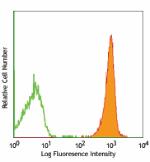
LOU rat splenocytes stained with OX-1 purified, followed by ... -
Biotin anti-rat CD45
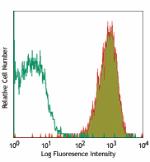
LOU rat splenocytes stained with biotinylated OX-1, followed... -
FITC anti-rat CD45
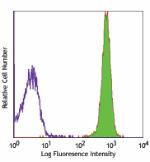
LOU rat splenocytes stained with OX-1 FITC -
PE anti-rat CD45
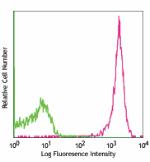
LOU rat splenocytes stained with OX-1 PE -
APC/Cyanine7 anti-rat CD45
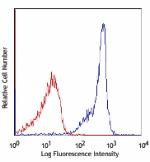
LOU rat splenocytes stained with OX-1 APC/Cyanine7 -
PE/Cyanine7 anti-rat CD45
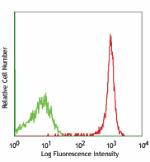
Lou rat splenocyte stained with OX-1 PE/Cyanine7 -
PerCP/Cyanine5.5 anti-rat CD45
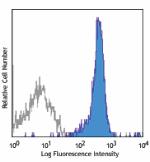
LOU rat splenocytes were stained with rat CD45 (clone OX-1) ... -
Alexa Fluor® 488 anti-rat CD45
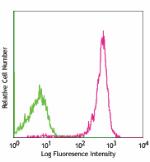
LOU rat splenocytes stained with OX-1 Alexa Fluor® 488 -
Alexa Fluor® 647 anti-rat CD45
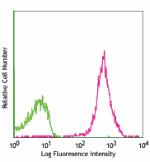
LOU rat splenocytes stained with OX-1 Alexa Fluor® 647 -
Alexa Fluor® 700 anti-rat CD45
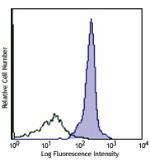
LOU rat splenocytes were stained with CD45 (clone OX-1) Alex... -
APC/Fire™ 750 anti-rat CD45
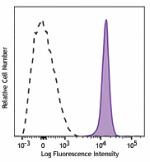
LOU rat splenocytes were stained with CD45 (clone OX-1) APC/... -
Pacific Blue™ anti-rat CD45
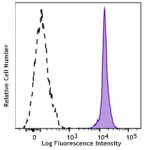
LOU rat splenocytes were stained with CD45 (clone OX-1) Paci... -
PE/Dazzle™ 594 anti-rat CD45
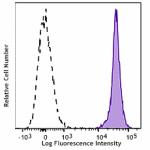
LOU rat splenocytes were stained with CD45 (clone OX-1) PE/... -
Spark Blue™ 550 anti-rat CD45 (Flexi-Fluor™)
-
Spark Blue™ 574 anti-rat CD45 (Flexi-Fluor™) Antibody
-
Spark Red™ 718 anti-rat CD45 (Flexi-Fluor™)










Follow Us